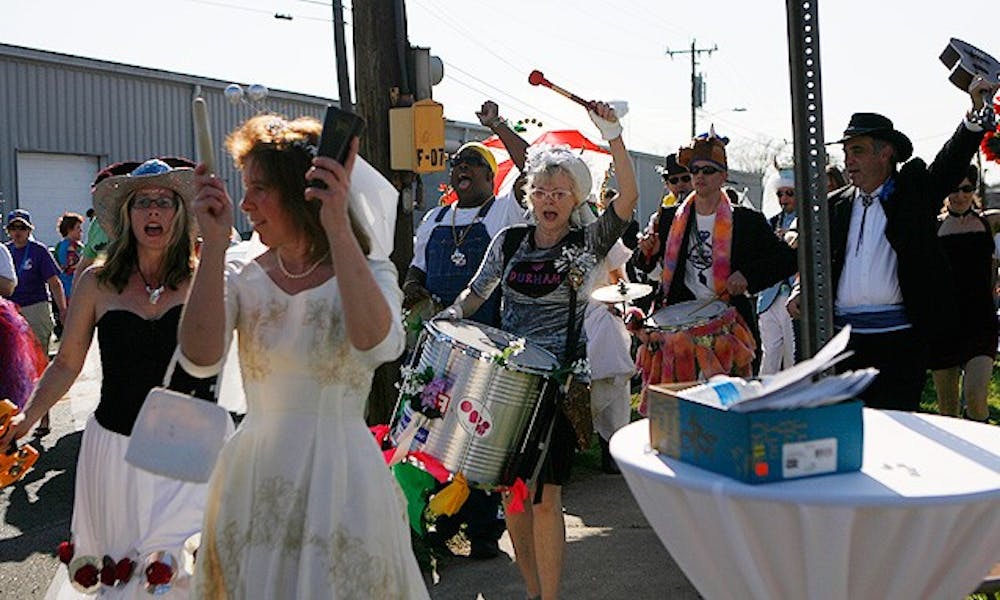More than 2,000 Durhamites held hands, declared their vows and married their city Saturday.
Marry Durham attendees vowed to be civically engaged, celebrate diversity, make environmentally sustainable decisions and support local businesses and nonprofits. In a symbolic gesture of residents’ commitment to their city, Reverend Carl Kenney conducted faux marriage ceremonies in a downtown Durham parking lot.
The event raised a total of $25,397 from individuals and Triangle-area businesses, more than double its original $12,000 goal, that will be distributed among five beneficiaries: the Eno River Association, Genesis Home, the Latino Community Development Center, the Scrap Exchange and the Walltown Children’s Theatre.
“When you get married, you marry your finances together,” said Merywen Wigley, the event’s coordinator. “Let’s bank locally, let’s put our money in local organizations that use our money to do good things in our community.”
The festival, which covered Rigsbee Avenue between West Geer Street and West Corporation Street, aimed to celebrate the city’s civic pride, Wigley added.
“The event is really about getting people who love Durham together to commit to the future of our community,” Wigley said. “It’s about celebrating the fact that we all love living here, and this place is so awesome.”
Local bands and dance groups performed at the event, while many of Durham’s food trucks—including the Sausage Wagon, KoKyu and Taqueria y Pupuseria El Buen Sabor—attracted long lines. Many attendees came in costume—Mark “Thunder” Zumbach strode down the wedding aisle on stilts while wearing a top hat and tails. A consultant who moonlights as an emcee, Zumbach said that Durham’s creative community is essential to its character.
“Durham’s got a great artist community,” Zumbach said. “They don’t just show up, they bring it.”
The event’s success reflected Durham’s rapid growth, said Mayor Bill Bell.
“[Marry Durham] shows how much this city has evolved for the better,” Bell said. “If you looked at this street three or four years ago, you wouldn’t have recognized it.”
Brian Green, an accountant who donated $500 to the featured charities, said he has been watching Durham evolve for the past nine years.
“I’ve been in the Triangle for about 18 years—the first 10 of which I lived in Cary, where Durham had such a horrible rap,” he said. “I got exposed to Durham in 2002 and instantly fell in love with it, and anything I can do to improve it I will.”
A single phrase sparked the event. “Last summer [a group of friends and I] were having this conversation about how great Durham is,” Wigley said. “Someone said, ‘Well, if you love it so much, why don’t you marry it?’ And that was how it began.”
Many community leaders attended, including Duke Dean of Students Sue Wasiolek, North Carolina Central University Chancellor Charlie Nelms and Rep. David Price, D-N.C. Noting that the event challenged citizens to engage more deeply in the community, Price stressed that Duke students should also pay attention to this message.
“My daughter was a Duke student, and two of her most significant and meaningful experiences were helping out at the soup kitchen and mentoring students,” he said. “A Duke student who doesn’t take full advantage of Durham is really missing something.”
A few attendees used the faux wedding as a platform to mock the rhetoric of anti-gay rights movements. One protestor shook a placard that read, “It’s Sodom and Gomorrah, not Sodom and Steve.” Another sign declared “City-sexuals are an abomination.”
The protestors seemingly represented the themes of the festival and maybe of Durham itself—an enduring passion for community and a taste for absurdity.
Get The Chronicle straight to your inbox
Signup for our weekly newsletter. Cancel at any time.

